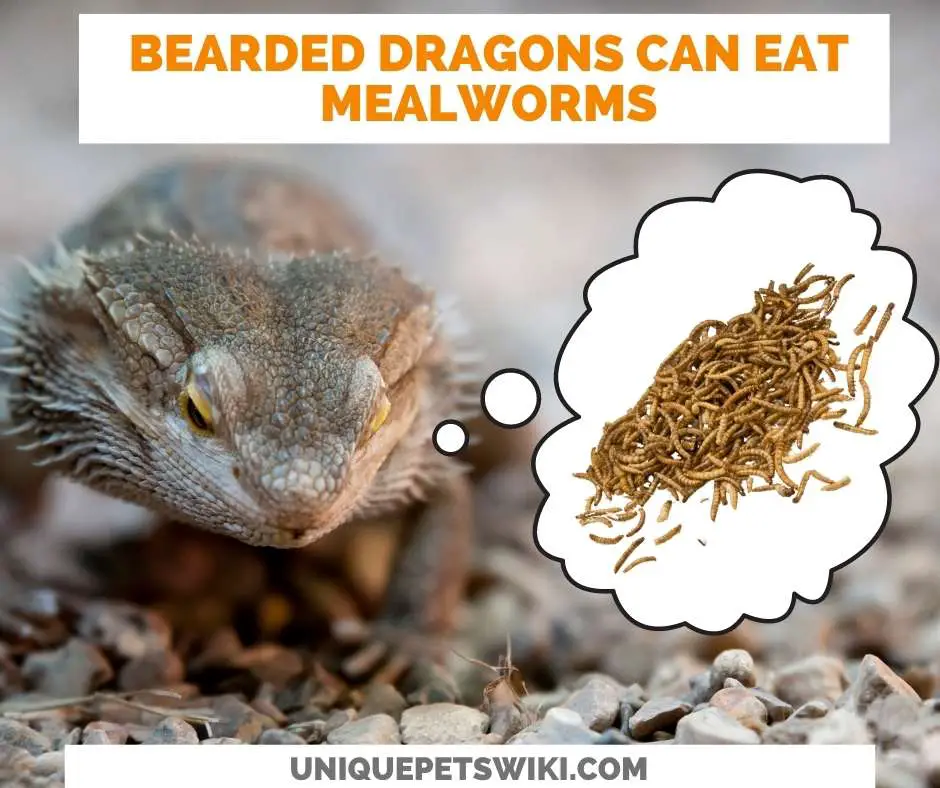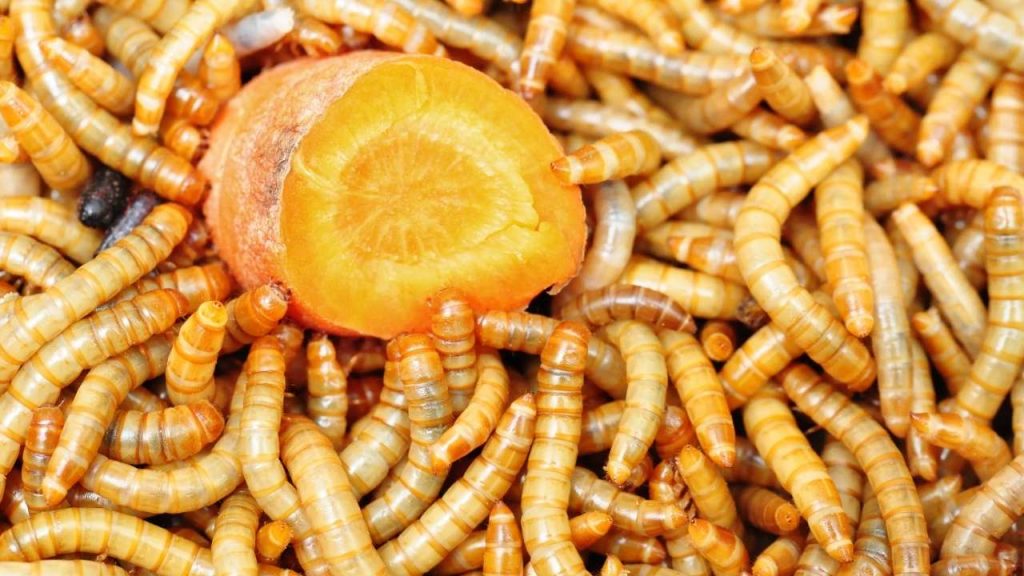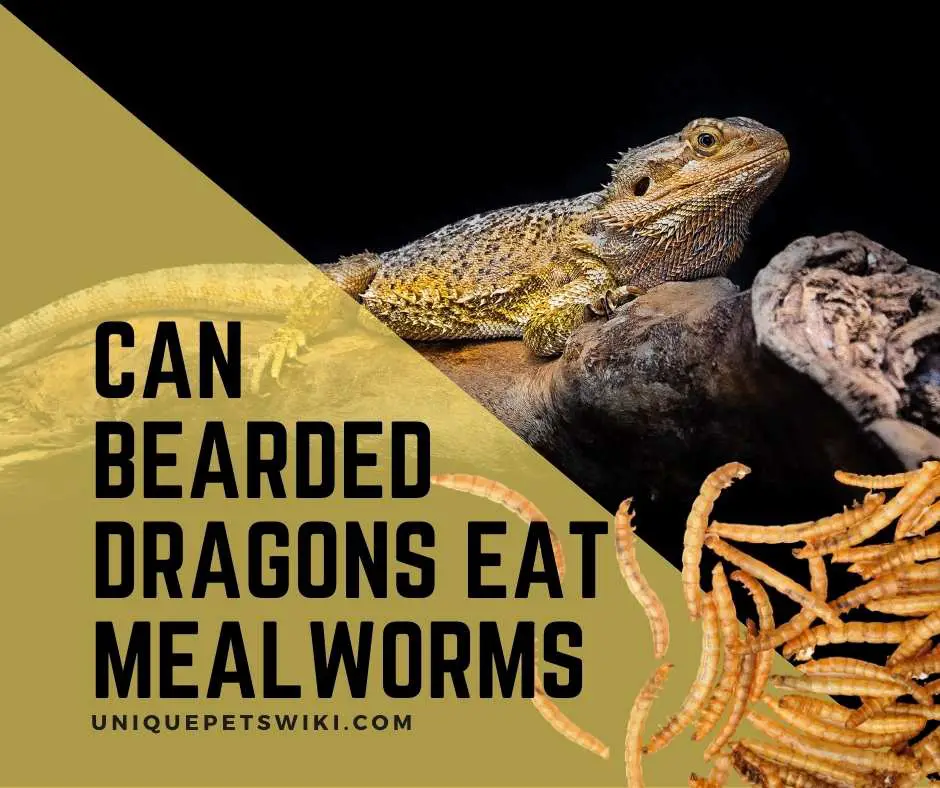If you offer mealworms to your bearded dragon, he will definitely eat it. Mealworms are one of the favorite treats of bearded dragons. It’s like fast food and is an example of live foods for them.
The way children love to eat noodles, similarly, mealworms are a favorite for bearded dragons. But a responsible owner will always want to know whether or not it is right to feed mealworms and what are the positive and negative consequences of it.
We have collected various suggestions from many researchers, reptile experts, and veterinarians and solved different queries related to mealworms and bearded dragons. So let’s read and find out if bearded dragons can eat mealworms and much more.
This article has been reviewed by Dr. Dilber. Read more about our knowledge control process here.
Contents
Can Bearded Dragons Eat Mealworms?

Bearded dragons like to eat insects, but it should be not a dominant part of their diet. Nutritional values of all the insects are compact and differ from each other due to which they can’t fulfill your bearded dragon’s health requirements.
Bearded dragons can eat mealworms. In fact, they love it and it can also be added to their diet daily as supplements.
Dragons are very easy to raise, but it is very important to take care of their diet and health. If you want to feed your pet beardie mealworms, then there are certain things you need to keep in mind when feeding mealworms to beardies.
Keep reading till the end to know more, it will help you a lot.
Can Bearded Dragons Eat Mealworms Every Day?
Mealworms have a high value of fat than protein. But they can be used as a source of protein with green vegetables. Bearded dragons love the taste of mealworms as a supplement or treat.
For all that, you need to be aware of its impaction. How does its feeding affect your bearded dragon if he is an adult or a baby?
For An Adult Bearded Dragon:
You should feed a calcium-rich diet to your adult bearded dragon. It is indeed his basic need. An adult body requires a balanced diet of calcium and phosphorus with a ratio of 2:1.
Therefore, it is not a decent choice if you feed mealworms every day to his bearded dragon.
You can add mealworms as a supplement into his salad bowl after each day. A pair of mealworms twice a week works fine for an adult bearded dragon.
For Baby Bearded Dragon:
Although intestinal impaction due to mealworms is rare, even reptile experts strongly disagreed to feed mealworms to baby beardies because it causes an intestinal blockage in their digestive system. Mealworms have a chitinous skeleton that becomes hard to digest if overfeed.
Are Mealworms Bad For Bearded Dragons?

Observe the nutritional value chart of mealworms (100g) below. We will discuss some key points that why mealworms are bad for bearded dragons.
Nutrition Value Chart Of Mealworms: (100g):
| Nutrients | Value | Unit |
| Fat | 13 | % |
| Protein | 20 | % |
| Cholesterol | 150 | mg |
| Calcium | 13.3 | mg |
| Moisture Content | 62 | % |
Fat:
As you can see from the above nutritional value chart, mealworms contain an excessive amount of fat, protein, and low calcium values. If you feed mealworms to your bearded dragon regularly, it will become Obesity and weak bones.
Addiction To Mealworms:
On top of that, bearded dragons get addicted to mealworms quickly. Your bearded dragon will eat nothing else other than mealworms. It will give you a tough job to get rid of this mealworm addiction from your bearded dragons.
Obesity:
(Image Source: Pinterest)
To attain a good nutrition diet, there should be a balanced intake of calcium, proteins, and even fat.
Unfortunately, mealworms bring unfavorable fats into your bearded dragon’s diet. Too often feeding mealworms results in obesity.
Fatty Liver Disease:
Another problem that occurs due to overconsumption of fat is that usually, pet beardies are kept in small cages. So they don’t have enough space as they have in wildlife to roam and exercise. This condition will ultimately result in fatty liver disease and even death.
High Phosphorus Quantity in Mealworms:
As you know that bearded dragons need a 2:1 ratio of calcium and phosphorus. Mealworms are not suitable for bearded dragons because they have a ratio of 1:3 of calcium and phosphorus.
Overfeeding of mealworms may result in metabolic bone diseases. You can use calcium and protein supplements to maintain calcium deficiency in his body.
Can Bearded Dragons Eat Mealworm Beetles?
Apart from mealworms, mealworm beetles have a good amount of protein and low fat. I would recommend you not to feed more than five to six beetles per week., just like the same way you serve mealworms.
Some beardies love the crispy shells and the crunchiness of it. But it is not compulsory that your pet lizard likes beetles. That’s why don’t force-feed mealworms beetles if your beardie is not eating it. Maybe he prefers mealworms over beetles!
Is It Necessary To Feed Mealworms To Bearded Dragons?
If your pet lizard is satisfied with his regular diet and routine, you do not need to feed it mealworms. But if you feel that your beardie is getting weaker or leaner, you must feed the macaws to make it healthy immediately.
Mealworms play a key role in the immediate recovery of bearded dragon’s health. As they become addictive for mealworms, therefore, definitely feed them for their speedy recovery.
At what age can bearded dragons eat mealworms?
Mealworms are well-liked insects feeder for reptiles, especially for bearded dragons. You can feed mealworms to your pet beardie when he reached the juvenile stage i.e.: 5-18 months.
Lets Recap
- Bearded dragons can eat mealworms. It is their favorite treat and the best insect feeder.
- You can feed a couple of mealworms twice a week to an adult bearded dragon.
- Baby bearded dragons have an immature digestive system. It can’t digest the chitinous exoskeleton. Hence, it is an awful choice to feed it to your baby beardie as it causes an intestinal blockage.
- Often feeding of mealworms may cause fatty liver disease and laziness in the adult bearded dragons.
- Bearded dragons have cravings for mealworms.
- Mealworm beetles are good for young bearded dragons. It has enough amount of proteins, fats, and calcium that a young dragon needs.
- 5 to 18 months is an ideal age to feed mealworms to bearded dragons.
